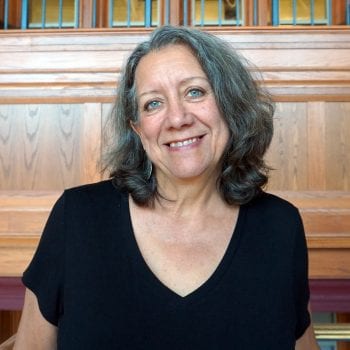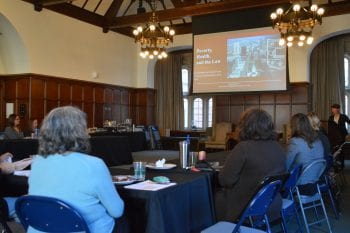
How will I get to work? Did the kids get to school on time? Do we have enough money for food this week?
The Faces of Poverty, formerly known as Poverty TRAP, has been a powerful component of the Gephardt Institute’s Leadership Through Service (LTS) pre-orientation program for many years. During the session, first year students break up into groups and receive packets that simulate the scenarios of poverty-stricken families, all based on real people in the St. Louis area. Over the course of two hours, the students simulate one month of a family’s life. The goal of the simulation is to help participants understand the complex circumstances and daily struggles people face when in poverty. Throughout the session, students also encounter unexpected obstacles. For example, a group might get a card specifying that their car broke down. How will I get to work now?
“One kink can throw off the entire system,” said Lu Oros, Coordinator of Civic Engagement Programs at the Gephardt Institute. For more than 15 years, Lu has worked with WashU students on projects related to hunger and homelessness. Each summer, she collaborates with LTS student coordinators to organize the simulation.
Cynthia Williams, Assistant Dean of Community Partnerships at the Brown School, approached Lu this fall to help adapt simulation content and share it with St. Louis city and county judges. “We wanted to create an environment so that the judges could develop empathy for the person in front of them,” Lu explained. “I understand that they are supposed to review the circumstances of the person, but there isn’t always time for that. This training might influence their decisions before they impose a fine or other punishment that will prevent the person from moving ahead.”
Lu partnered with Linda Raclin, senior lecturer with the Brown School and expert in health law and policy, and ArchCity Defenders, a nonprofit organization dedicated to providing the best possible legal counsel to homeless and poor individuals facing prosecution. Linda teaches Poverty, Health, and the Law, a graduate course for students in the Master of Public Health Program. Lu presented to students and explained several root causes of homelessness that people don’t typically think about. “The stereotypical person that you think of as a homeless person isn’t true anymore,” she noted. “It’s not what you assume.”
Lu also worked with the Brown School and ArchCity Defenders to transition The Faces of Poverty into a logic model format. Staff at ArchCity Defenders helped formulate a series of questions to represent St. Louis’s most vulnerable individuals and the issues they face. “With this model,” Lu explained, “we ask questions and showcase how different answers lead to different consequences. The decisions people make to survive can lead them to this place when they’re in front of the judge. One question, for instance, asks what you would do if your car breaks down and you are on a fixed income. Do you spend it on food, the car, or bus fare? Every time you make a decision like that, it affects what happens next. Not everything is as black and white as you think it is. These people are just trying to survive.”
When asked about the intended outcome of the logic model exercise, Lu noted that, “One of the things that I think is really important for people to realize is that it’s not ‘us’ and ‘them;’ it’s ‘we.’ A person may find themselves homeless or in poverty, but this does not define who they are. Especially someone who finds themselves without a home: they had a life before, and they will have a life after.”

On December 8, students in the Poverty, Health, and the Law course presented questions to over 30 attendees, including six judges. They also discussed topics including employment, transportation, income and budget, health, stop and search disparities, and fines. The event ended with a question and answer period, and several judges shared what they are currently doing to be more empathetic while also staying within the guidelines of local laws.
Lu’s role in this partnership has amplified the Gephardt Institute’s mission and programs in a critical way. “As we develop citizens,” she sums, “we want to educate our students to be actively involved. Connecting with the community makes it more real.” She encourages all members of WashU and the surrounding community to consider the root causes and long-lasting effects of poverty, but more importantly to engage with our most vulnerable citizens: “You need to meet a person face to face, and understand that everyone’s story is different.”
If you are interested in getting involved in issues related to poverty, hunger, or homelessness, contact Lu at luann.oros@wustl.edu. Lu also encourages students and faculty, staff, and community partners to engage with the issues they are passionate about by connecting with like-minded organizations, exercising their right to vote, and reaching out to their local legislators to express their views.